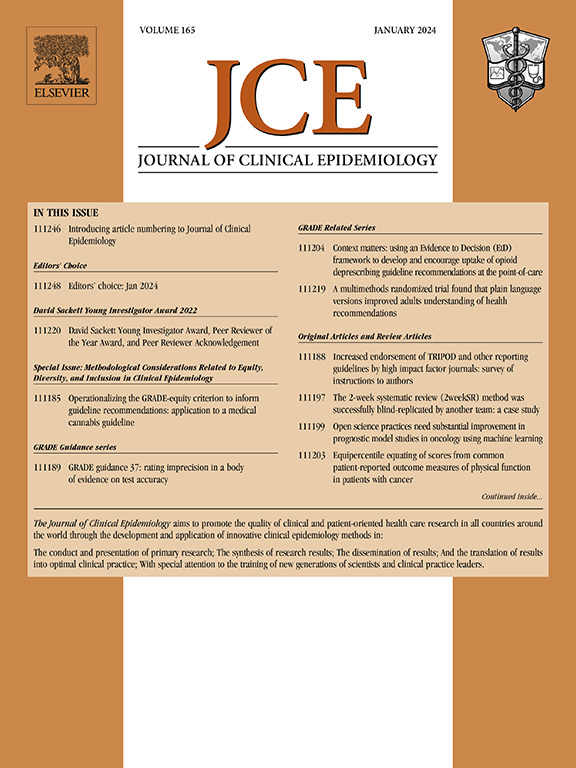实用证据和随机试验的性质。
IF 5.2
2区 医学
Q1 HEALTH CARE SCIENCES & SERVICES
引用次数: 0
摘要
实用主义审判越来越得到认可。然而,什么是实用主义审判经常被误解。它们经常被肤浅地描述为它们的表现和表面,作为在“现实世界”环境中进行的研究,具有广泛的纳入标准和不太复杂的研究程序。然而,这些特征既不是必需的,也不是定义特征。他们也不能保证分享这些数据的试验对医疗实践有用。有一种危险是忽视了强有力的务实方法的本质。在这里,我们描述了实用方法的关键要素以及与随机试验的原始性质的密切关系。我们的目标是重新关注证据的教学、研究和解释,不是作为一种新颖的方法,而是回归到实用证据的本质和随机试验的本质。我们首先回顾实用主义在哲学中的起源及其在医学中的引入,并以纯粹的形式重新审视随机试验的本质。我们强调评估治疗决策和理解这些决策的机制之间的关键区别。我们展示了为什么目前关于医学随机试验的观点已经失去了实用的焦点,解释设计的特点是盲法和依从性控制通常被视为随机试验的定义特征或质量标准。然后,我们强调了对实用主义试验的常见误解,并总结了它们的主要特征,以提供实用主义证据。本文章由计算机程序翻译,如有差异,请以英文原文为准。
Pragmatic evidence and the nature of randomized trials
Background and Objectives
Pragmatic trials are increasingly gaining recognition. However, what pragmatic trials are is frequently misunderstood. They are frequently described superficially by their manifestation and surface only, as studies conducted in “real world” settings, having wide inclusion criteria, and less complicated study procedures. However, these features are neither necessary nor defining characteristics. They also do not guarantee that trials sharing them are useful to inform medical practice. There is a danger of losing sight of the essence of the powerful pragmatic approach.
Methods, Results, and Conclusion
Here we describe the key elements of the pragmatic approach and the close relationship with the original nature of randomized trials. Our aim is to refocus teaching, research and interpretation of evidence, not as a novel approach but as a return towards the essence of pragmatic evidence and the nature of randomized trials. We first go back to the origin of pragmatism in philosophy and its introduction in medicine and revisit the nature of randomized trials in their pure form. We highlight the critical distinction between assessing treatment decisions and understanding the mechanisms of these decisions. We show why the current view on randomized trials in medicine has lost a pragmatic focus, with the explanatory design features blinding and adherence control often seen as defining characteristics or quality criteria of randomized trials. We then highlight common misunderstandings of pragmatic trials and conclude with an overview of their key features to provide pragmatic evidence.
求助全文
通过发布文献求助,成功后即可免费获取论文全文。
去求助
来源期刊

Journal of Clinical Epidemiology
医学-公共卫生、环境卫生与职业卫生
CiteScore
12.00
自引率
6.90%
发文量
320
审稿时长
44 days
期刊介绍:
The Journal of Clinical Epidemiology strives to enhance the quality of clinical and patient-oriented healthcare research by advancing and applying innovative methods in conducting, presenting, synthesizing, disseminating, and translating research results into optimal clinical practice. Special emphasis is placed on training new generations of scientists and clinical practice leaders.
 求助内容:
求助内容: 应助结果提醒方式:
应助结果提醒方式:


